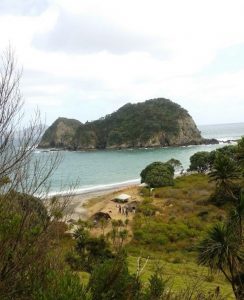Archaeologists unearthed artefacts and remains of a settlement at Moturua Island, New Zealand, which might point to the arrival of the first Polynesians in the region, around 700 years ago.

The artefacts consist of a pendant made from shell that appears to have originated in tropical Pacific waters, bones of Polynesian dogs, cooked remains of seals, shellfish and moa bird. The site was known for almost 40 years but no systematic research has been conducted on it. Previous excavations in 1981 unearthed bone fish hooks, shell fragments and the bones of animals found in a stone-lined underground oven, but the results remain unpublished. These artefacts are to undergo analysis and research for the first time in an effort to determine if the site may have once been home to some of the first Polynesians to settle in New Zealand.

The researchers state that there were signs of archaeological layers revealed that indicate the site was occupied successively during different periods of Maori cultural development. This is an unusual find in New Zealand, where many early sites were often abandoned when some key local resource became scarce. The excavation at Moturua Island this year led by James Robinson was a partnership between New Zealand’s Department of Conservation, the government agency Heritage New Zealand, archaeologists from the University of Otago at Dunedin in the South Island, and two local Maori clans: Ngati Kuta and Patu Keha.
(after Heritage New Zealand & Live Science)